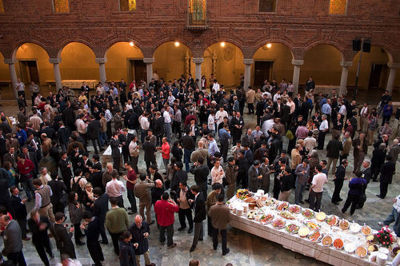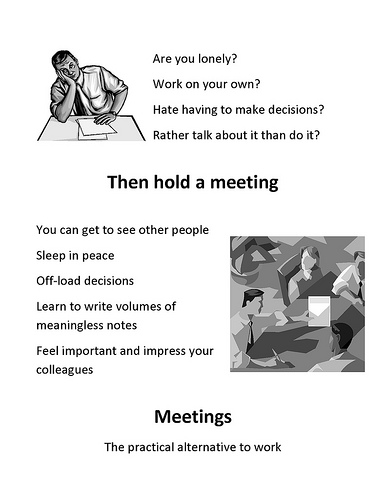Day in the life of a conference and events organiser
" Day in the life of a Conference or Events Organiser
A Conference or Event Organiser may work independently or with a company to provide full service management for conferences including but not limited to conference design, registration, site and venue selection and booking, audiovisuals, IT support, logistics, leisure management, marketing, printing and web services, sourcing speakers, funding and sponsorship, financial management and budget control. Wikipedia
This is the second of four courses which form "Introduction to Tourism" a course contained within the Certificate in Applied Travel and Tourism programme. Once all four courses have been completed those enrolled will have gained the New Zealand National Certificate in Tourism (Core Skills) Level 3.
Contents
Learning Objectives
Unit Standards linked to this course: US 18212, US 23758, US 23761, US 23764, US 23766, US 23767, US 23768, US 24872
Scenario
The New Zealand Wine Institute 2015 are holding their annual conference at the Mission Estate Winery near Napier from Friday 9th until Monday 12th October 2015. Your task is to organise the conference including an information pack, registrations and.......
Find a local meetup group and offer to assist in a conference. Similar local meetup group are in other towns and cities. Offer feedback and support on growing and developing the meetup group. Group meets at different times/days.
Create a ficional/joke conference website. Enable signups: What makes them fool for it?
What is Event Tourism?
Event tourism is when an "event" is staged to encourage people to travel to a destination because of the occurrence of the planned event. They are usually temporary occurrences e.g. have a finite length - it is usually a one-off - you cannot experience it again in exactly the same way e.g. even though the Olympic Games occurs every four years, it is at a different venue. Every event is unique in the setting, management, those attending and the duration. 'Events' can include the following range of activities:
- sporting events e.g. Rugby World Cup
- festivals e.g. Dunedin's Fringe Festival
- meetings
- incentive travel programmes - usually employee reward by a company for targets exceeded or job well done
- conferences and conventions
- exhibitions e.g. trade shows
The last four categories are known as the acronym MICE and the industry has its own trade association.
According to wikipedia, event planning is the process of planning a festival, ceremony, competition, party, or convention. Event planning includes budgeting, establishing dates and alternate dates, selecting and reserving the event site, acquiring permits, and coordinating transportation and parking. Event planning also includes some or all of the following, depending on the event: developing a theme or motif for the event, arranging for speakers and alternate speakers, coordinating location support (such as electricity and other utilities), arranging decor, tables, chairs, tents, event support and security, catering, police, fire, portable toilets, parking, signage, emergency plans, health care professionals, and clean up.
Stakeholders The overall experience of the event is reliant on the roles of numerous service specialists, performers, exhibitors, tourism suppliers, government departments, clubs and sporting organisations, the host community and of course, the participants and spectators.
Venues Event venues can vary from utilising conference facilites at a hotel or resort to a purpose built conference and convention centre to a paddock which is turned into a music festival. For hotels, conferences and meetings are an important source of income paticularly in the off-season.
Festivals
Festivals are held throughout the world to commemorate historical events, religious and cultural celebrations and to acknowledge the changing of the seasons. Please provide details of a festival that would be included under one of the following types of festivals.
- Arts festival
- Beer festival
- Comedy festival
- Cultural festival
- Film festival
- Folk festival
- Food festival
- Music festival
- Religous festival
- Science festival
- Wine festival
- Winter festival
MICE Industry
Meetings
In a meeting, two or more people come together for the purpose of discussing a (usually) predetermined topic, often in a formal setting. e.g. Commonwealth Heads of Government (CHOGM). Formal meetings are conducted based on established rules which are often guidelines set out in a 'constitution'. The rules are established to ensure that every participant at the meeting has an equal opportunity to speak and to help make decisions. In pairs, research the roles of the following meeting participants:
- The chairperson
- The secretary
- The treasurer
The steps in staging a meeting are as follows:
1. Convening - deciding where and when the meeting will be held
2. Notice of meeting - notice which states the date, time and place of meeting and includes the subject of the meeting
3. Agenda - the agenda is a list of items of business to be transacted
4. Welcome - chairman greets members at the meeting
5. Apologies - names of members who have apologised because they cannot attend
6. Minutes of previous meeting - must be confirmed as a correct record and then any business arising from minutes is discussed
7. Correspondence and financial report
8. General business - any matters members wish to discuss
9. Motions - are formal proposals for consideration placed before the meeting by one of the members. The members usually discuss the issue and then the chairman will ask is someone will 'second' the motion and then it will be accepted by the meeting.
To understand the economic impact of the meeting industry, go to the 2011 to see the significance to the United States economy Economic significance study
Incentive Travel
Incentive Travel programmes are set up by Companies to reward employees for productivity or long service or to motivate employees or executives to improve performance or to obtain certain goals. They can also be set up to reward clients of a business who has purchased a certain amount of product from them e.g. carpenters purchasing materials from Placemakers, advertising being purchased from the Otago Daily Times.
Some of an Incentive Travel Planner's duties will include:
- liasing with clients to source business
- working with airlines, hotels, tour operators to develop various plans and itineraries
- processing all the travel bookings and presenting documentation to the client
- follow up with the client
- presenting new ideas and proposals
- maintaining contact with suppliers
Conferences, Conventions and Exhibtions
Conferences and conventions are one of the fastest growing and lucrative areas of the tourism industry. They are advantageous to the tourism operators as they often occur outside the normal tourism season so provide an income in the off peak periods. They can range in size from a small group attending an exhibition of products to an excess of 4000 people attending a large convention. The venues can be at hotels, resorts or specialised convention centres.
Skills required for Conference and Events Planner
Conference and event planners must have excellent organisational and administrative skills including the ability to follow through and ensure tasks are completed. They should be "people orientated" be empathetic both to the needs of the other team members who are co-ordinating the event, and also the needs of the delegates and stakeholders. They must have a high level of written and verbal communication skills and be able to interact with a wide range of people at all levels of the business environment.
To achieve their tasks, they must have exceptional time management skills and also posses problem solving strategies. The conference and events planner must also have good negotiation skills and be able to relate to people from a wide range of different cultures.
Budgeting skills may also be required and they must keep up-to-date with the latest technology both for communicating with clients and also for speakers and delegates to utilise at the conferences.
Communication skills includes face to face, letter, fax and itinerary presentation and customer service. Being able to successfully work as part of and or leading a team, is vital to the success of the conference and events planner. Some of the advantages of team work are:
- having a common purpose or goal
- being able to support each team member to complete tasks
- being able to communicate with each other - each team member should be able to freely express ideas
- people able to develop new personal skills
- improve work processes through effective problem solving because of the collective expertise available
- provide high quality service
- team is recognised for outstanding results
The team members need to establish their different roles and responsbilities after they have discovered each others strengths and weaknesses so they can allocate roles to each person. A team leader must be nominated to be responsible for the team achieving the end result, and maintain unity and to ensure everyone is contributing equally, fairly and fully. Synergy is achieved when the sum of the total is greater than the sum of the individual parts. In your conference groups, elect the team leader and allocate tasks to each team member. Ensure you plan using the SMART objectives e.g. specific - detail each team members task, measureable - how many or how much, achievable - ensure they have the skills, knowledge and equipment, relevant - covers all of the tasks required to complete the assessment, timely - you have the final completion date as well as times when you met to ensure all team members are "on task".
Administration
This course is used in the following programme:

